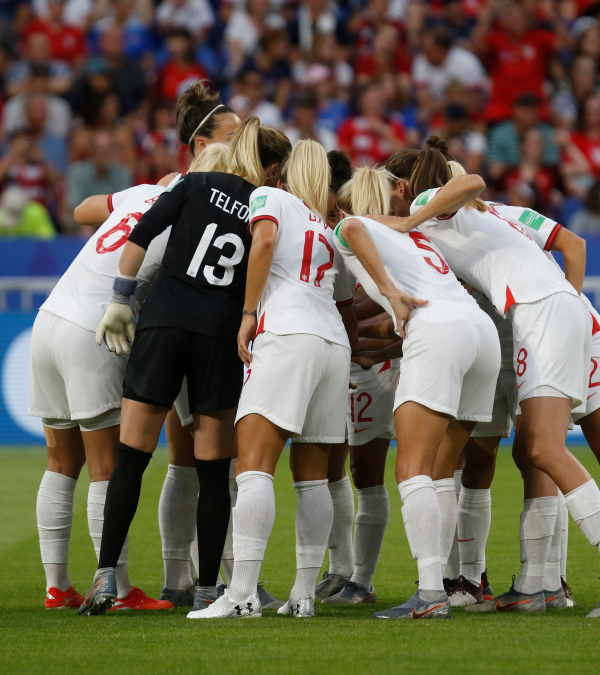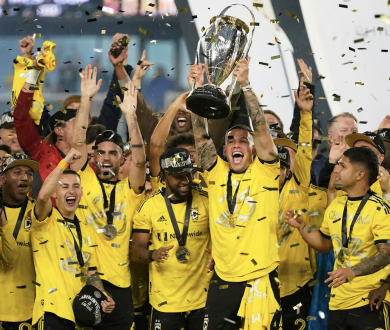
Empowering Women in Coaching: Breaking Barriers in Women's Football
This summer, the world has the opportunity to watch countries compete in the FIFA Women’s World Cup hosted by Australia and New Zealand. In June of 2023, we had the privilege to attend the Women's Champions League Final between FC Barcelona and VfL Wolfsburg in Eindhoven. The exhilarating match, witnessed by 33,147 spectators, served as a powerful testament to the evolution of women's football in Europe. As we marveled at the performance delivered by Jonatan Giráldez Costas, Head Coach of FC Barcelona Femení, and Tommy Stroot, Head Coach of VfL Wolfsburg Women, we couldn't help but notice that neither women’s team was led by a female Head Coach. The question became, is this a male-dominated role across clubs and leagues or an isolated depiction of two impressive male coaches leading their clubs in this final?
Recent Trends in the Market
In recent years, female Head Coaches in the women’s game have been breaking barriers and defying stereotypes, opening new doors for aspiring coaches and players, bringing fresh perspectives, and extensive experience to the game. While there has been an increase in opportunities arising for female coaches at the top women’s football, there is still a gender gap. 12 of the 32 coaches at the 2023 FIFA Women's World Cup are women. This number has not changed since the last FIFA Women's World Cup in France in 2019. However, as the women’s game is growing globally, with equitable support, education, and structured talent pipelines, the opportunities for female coaches in the women’s game should grow alongside it.
History of inequality despite performance
The path to progress hasn't been without challenges. In the past, female Head Coaches faced significant obstacles rooted in stereotypes and societal biases. One such example is Corinne Diacre, a former player for the France Women’s National Team, who made history in 2014 by becoming the first female Head Coach of Clermont, a men’s 2nd division team in France. During her tenure, she led the team from the bottom of the league table to near promotion, achieving results that other male coaches hadn’t been able to reach with the club. However, despite her success, she faced criticism and gender inequality in the media. In an interview with Sky Sports in 2018, Diacre stated,
"Today, women are still objects," she added. "You still get asked questions about things that in my eyes are quite frankly completely ridiculous but we still have to fight today about these issues. But us women in football today focus on the important things - that is, our passion for football, and that's all we are about today."
Lack of representation
The lack of representation remains evident. When evaluating the top 16 clubs in the Women's Champions League over the past five years, female Head Coaches have represented just 11.8% (6 out of 51) of these teams competing. In international competitions, still, less than one-third of all teams in the last five FIFA Women's World Cups were led by female Head Coaches with a 29.3% representation rate.

Cycle of limited opportunities
The limited opportunities to learn and grow have been a major obstacle due to a history of leagues and federations lacking networks and resources for aspiring female coaches that exist for their male counterparts. Addressing this challenge requires creating comprehensive networks and tailored resources, including mentorship programs and coaching clinics to empower women in coaching. Over the last five FIFA Women’s World Cup and Champions League seasons, Sportsology Group's research shows the number of female Head Coaches participating is on the rise. However, with each step, there is still a pressing need for more opportunities and support for women in coaching positions in both club and international competitions.
Shift in Perception and Attitudes
Fortunately, there is also a notable shift occurring in the views and attitudes toward female Head Coaches. Cultural barriers are being challenged, and recent success stories have played a significant role in reshaping perceptions.
Success stories serving as role models:
Coaches like Emma Hayes, who has been at the helm of Chelsea Women since 2012, transformed the club into a dominant force in both domestic and international competitions. Under her leadership, Chelsea won the Women's Super League (WSL) six times and reached the Champions League final in 2021. Hayes' dedication, tactical acuity, and commitment to developing players have earned her widespread respect in the football community and have set the tone for female coaches in the professional game.
Additionally, coaches like Sarina Wiegman and Jill Ellis have made significant strides and achieved remarkable results. Under Wiegman's leadership, the Dutch National team won the UEFA Women's Euro 2017, defeating Denmark in the final. Later, she was appointed as the Lionesses' Head Coach, leading the team to victory in the 2022 UEFA Women's Euro. This triumph marked a turning point for women's football and inspired a new generation of female players and coaches in the UK. Ellis’s coaching career with the USWNT was an inspiration to many. During an interview for Medium in 2019 she stated,
“I started having younger coaches come up and tell me, ‘It’s been great to see a female coach reach the national team level. I just want to do what you’re doing. Now I’m very much an advocate. I see how important it is for people who aspire to a career in coaching to have someone who represents what they want to do professionally.”
Addressing existing barriers and challenges
Breaking barriers and fostering opportunities for female Head Coaches in women's football requires addressing the existing challenges and barriers that hinder their progress. Gender bias has long perpetuated the notion that coaching roles are reserved for men, leading to underrepresentation of women in coaching positions. This lack of representation creates a dearth of role models for aspiring female coaches. Moreover, limited access to networks and resources has hindered their career advancement. The glass ceiling effect further exacerbates the situation, as women may be overlooked for top coaching positions despite their qualifications and experience. Work-life balance challenges, implicit bias, and stereotypes also pose significant hurdles. To overcome these obstacles, initiatives focused on diversity and inclusion, tailored coaching education programs free from bullying and harassment, mentorship opportunities, and awareness campaigns are essential.
Creating an inclusive coaching environment will empower women coaches, enrich women's football, and promote innovation and excellence in the sport. To achieve this, concerted efforts will be necessary. The consequences of ignoring women’s experiences of coaching will perpetuate the systemic inequity women face in football and contribute to the ongoing silencing and exclusion of them from coaching and other leadership roles within the sport.
Providing Equal Opportunities
Access to educational & mentorship programs
Education plays a key role in promoting gender equality in coaching. Initiatives by FIFA, UEFA, and football governing bodies aim to provide aspiring female coaches with the necessary skills and knowledge to excel in their roles. Equally important is the role of mentorship in nurturing and guiding these coaches on their journey to success. Visible role models, like the 12 female Head Coaches participating in the FIFA Women's World Cup 2023, along with the previously mentioned Head Coaches, inspire and empower the next generation of coaches in women’s football. The UK for example, is showing its determination to offer women the opportunity to become Head Coaches, with the FA creating a Women's Leadership Program designed to identify, nurture, and develop talented female coaches and leaders within the women's game. At Sportsology Group, we view these initiatives positively, as they drive change, foster inclusivity, and empower female coaches. We firmly believe that continuous evaluation and enhancement of such educational and mentorship programs are essential for their long-term effectiveness in fostering an environment where women can thrive as Head Coaches in women's football and beyond.
Aish Ravi, Founder of the Women’s Coaching Association and PhD Candidate at Monash University tells Sportsology Group,
“Research suggests we need to move beyond mentorship to sponsorship of female coaches. We need to identify and promote male sponsors of women coaches and have solid support networks for women coaches.”
Pathway to club coaching success for women
Creating equal access and opportunities for women in coaching requires attention and support. By investing in coaching education programs and providing equal opportunities for women to gain practical experience, the pathway to coaching success can be paved. Recognizing and valuing women's talents, both on and off the field, will further strengthen the coaching landscape in women's football. It is essential to acknowledge and highlight the fact that the vast majority (89.66%) of female coaches have had a professional playing career. This background brings unique insights and perspectives that can be highly valuable, being familiar with the challenges and experiences that women face on- and off the field. Ravi shares,
“We need to create stronger talent development frameworks in order to identify and nurture women so they are better equipped to succeed and navigate the football coaching landscape.”
Conclusion
Sportsology Group's research sheds light on the positive growth pattern of female Head Coaches in the past five Women’s World Cup and Champions League seasons, showcasing the progress made in empowering women in coaching. While we celebrate the achievements thus far, it is clear that there is still work to be done. With sustained efforts and commitment, the market has the potential to attract and develop top talent that will undoubtedly continue to break barriers and emerge as leaders in women's football and beyond. As we look ahead, we predict that the numbers of female Head Coaches will continue to rise steadily, reflecting the growing recognition of their skills and the increasing commitment to gender equality in coaching. By nurturing a more inclusive coaching environment, both clubs and organizations can pave the way for a future where women's football flourishes, creating a lasting impact on the sport and inspiring generations to come.
Through our commitment to sharing knowledge, creating networks, and providing insights and stories, Sportsology Group aims to accelerate progress in equality. We achieve this by connecting female leaders, sharing best practices from sports, and running webinars that facilitate learning and collaboration.
Want to learn more about us and our research into female Head Coaches in women’s football?
Please submit your information below, and we will follow up.
Special thanks to Aish Ravi, Founder of the Women’s Coaching Association and PhD Candidate at Monash University











